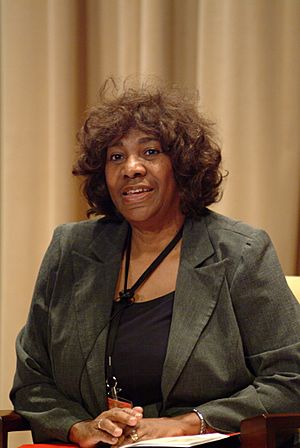Georgia M. Dunston facts for kids
Quick facts for kids
Georgia Mae Dunston
|
|
|---|---|

Dunston in 2008
|
|
| Born | August 4th 1944 Norfolk, Virginia U.S.
|
| Alma mater |
|
| Scientific career | |
| Fields | Human Genetics |
| Institutions |
|
| Thesis | Immunogenetic studies of the XH system of human serum alpha-globulin (1973) |
| Doctoral advisor | H. Gershowitz |
Georgia Mae Dunston, born on August 4, 1944, is an American scientist who studies genetics. She is a professor at Howard University and helped start the National Human Genome Center there. Her work focuses on understanding human genes and how they relate to health and disease.
Contents
Growing Up and Learning
Georgia Mae Dunston grew up in Norfolk, Virginia. Her parents worked hard in different jobs. Her father, Ulysses, was a cook, and her mother, Rosa, worked as a cleaner. Even though her parents didn't go to college, they supported her.
Dunston went to her local Baptist church and Sunday school. She became interested in genetics because she grew up in a segregated town. She was curious about why people are different.
When she was about to finish high school, Dunston wasn't sure about college. No one in her family had gone before. But she loved Human biology and decided to keep studying science. She did very well in school and earned a full scholarship to Norfolk State University.
College Studies
Dunston earned her first degree in Biology from Norfolk State University. Then, she received a special research fellowship. This allowed her to get a master's degree in Biology from Tuskegee University.
For her master's project, Dunston studied the DNA of pigeons. She used special methods called Chromatography and Electrophoresis. Her professor, David Aminoff, was very impressed with her work. He helped her get funding to study for her PhD in human genetics.
In 1972, Dunston earned her PhD in human genetics from the University of Michigan, Ann Arbor. During her PhD, she made important discoveries about certain markers in human blood. She also found that these markers were similar in different types of monkeys. This helped scientists understand how species developed over time.
A Career in Science
After getting her PhD in 1972, Dr. Dunston became a professor at Howard University. She worked in the microbiology department. From 1975 to 1976, she also did a special research project at the National Cancer Institute. There, she focused on how the body's immune system fights cancer.
During this time, Dunston also advised several important health programs. She helped with programs for sickle cell anemia and cancer research. She also worked with groups studying environmental health and genetic diseases.
Research at the National Cancer Institute
In 1982, Dr. Dunston became a scientist at the National Cancer Institute. She studied the special characteristics of human killer cells. These cells are part of our immune system.
Three years later, she became the director of the Human Immunogenetics Laboratory. She was very interested in how genes affect our immune system. She studied how these genetic differences relate to diseases in African Americans. Understanding these genes could help African Americans get organ transplants more easily. It also helped scientists learn more about how our immune system works.
Leading New Discoveries
From 1991 to 1994, Dunston was an associate director at the Howard University Cancer Center. She helped write a report about organ donation for the Black community. In the mid-1990s, she joined a new program at the National Human Genome Research Institute.
She worked with Dr. Francis Collins, who led the Human Genome Project. Together, they published research on the genetics of type 2 diabetes in West Africa.
In 2001, Dr. Dunston founded and directed the National Human Genome Center (NHGC) at Howard University. This center was a partnership between Howard University and the National Institutes of Health. Dunston and her team built a large research network. They focused on studying genetic diseases common in African Americans and other African populations around the world.
Today, Dr. Dunston continues her research as a full professor at Howard University. Her work explores how the diversity of human populations can help us understand the human genome better.
Awards and Honors
Dr. Georgia Mae Dunston has received many awards for her important work:
- Howard University College of Medicine Outstanding Research Award
- NAACP Science Achievement Award
- Howard University Graduate School of Arts and Sciences Outstanding Graduate Faculty Member Award (for teaching excellence)
- E. E. Just Award and Lectureship from the American Society of Cell Biology
- AARP's Impact Award
- She is a member of the National Advisory Council for the National Institute of Environmental Health Sciences.
- She is a member of Sigma Xi, a science honor society.
- She was a member of the National Academy of Sciences Review Committee on the Human Genome Diversity Project.
 | Ernest Everett Just |
 | Mary Jackson |
 | Emmett Chappelle |
 | Marie Maynard Daly |

